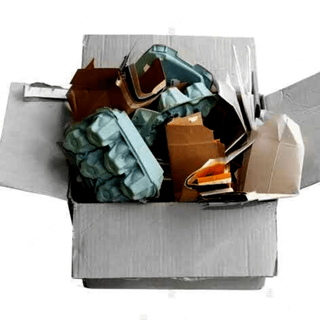In a literal about-turn, up to 260 tons of toxic waste — containing used mattresses, rugs, and carpets, but also hospital waste sent to Sri Lanka by the United Kingdom, is making its way back to the West after Sri Lankan authorities found the shipment in violation of international law. The illegal, hazardous waste first arrived in Colombo between September 2017 and March 2018 in 263 containers, only a fraction of which — 21 containers — has been sent back so far, with the rest at the Colombo port still, awaiting further legal action.
“We are working to secure compensation from those responsible for getting the containers into the country,” Sri Lanka’s customs spokesperson Sunil Jayaratne said. While the contents of the hospital waste in this particular shipment are not known, Sri Lankan customs has previously reported receiving rags used in hospitals and even body parts in earlier shipments. In 2019, Jayaratne had said, “It is very difficult to examine due to the odor and the fluids that are coming out of the containers.”
Such shipments are illegal under international law, first codified in 1989 under the Basel Convention, when the world awoke to the environmental and subsequent human rights violations the shipping of hazardous waste posed to the lives of people living in developing countries. An escalation of the Not In My Backyard (NIMBY) syndrome, the developing world increasingly shipped their toxic waste, especially which was environmentally and economically challenging to dispose of, to countries in Asia, Africa, and Latin America where the disposal was cheap, and policies around environmental protection few and far in between. The Basel Convention, and subsequent Hazardous Wastes Rules adopted by countries such as India, were targeted toward combating this ‘toxic trade,’ and even enable ‘reverse dumping’ such as seen in the latest news from Sri Lanka if need be.
Related on The Swaddle:
Manufacturing New Clothes Will Always Harm the Environment
More than 30 years later, countries have made some headway in tackling this problem, such as when India banned the import of plastic waste in 2016 to combat growing environmental concerns. However, ground-level implementation of these rules has appeared to be quite inefficient, as India stares down the barrel at biomedical and e-waste crises even today, unable to deal not only with its own generation of such waste but also inefficient at closing its borders down to illegal imports from other countries. For example, in 2019, when Indonesia exercised its own ban on hazardous waste imports on shipments from the U.S., 38 containers carrying contaminated waste simply got re-shipped and sneaked into India, through two ports in Gujarat and Maharashtra.
Another avenue of waste dumping that goes unregulated due to an inefficient system of checks and balances is the import of electronic waste, such as computers, mobile phones, cameras, and batteries. India has one of the highest rates of e-waste collection and recycling, taken up by a largely unregulated industry made up of waste-pickers. Depending on the harmful processes of recycling of this e-waste for their livelihoods, the waste pickers are made to exist amid toxic gases that arise from open incineration and acid washing of the waste, which is known to cause long-term and severe health consequences for their lives.
In the absence of proper, health- and environment-focused regulation of waste dumping, which not only limits the amount of waste dumped in developing countries but also centers the wellbeing of those who handle it, this international practice poses one of the most severe human rights violations of our time. While India, too, has sent back waste to countries like the U.S. in the past, albeit inconsistently, it’s clear we need better laws (and their implementation) to actually make a dent in this bustling economy of global waste trafficking.




